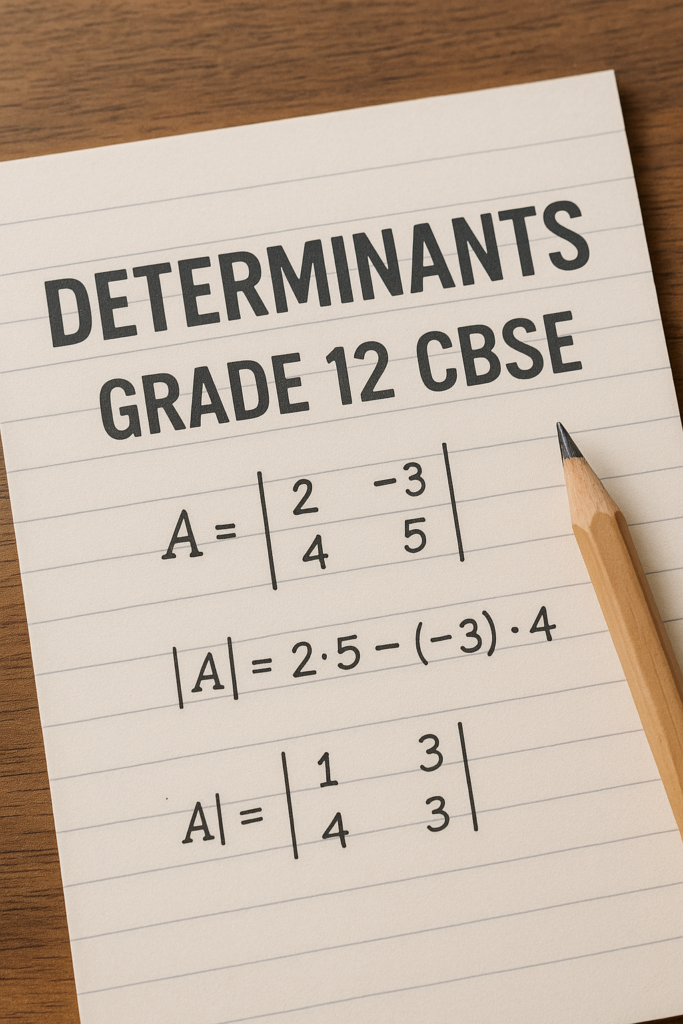Determinants – CBSE Class 12 Maths: Concepts, Formulas & Applications
Determinants are an integral part of CBSE Class 12 Mathematics and form the foundation for many advanced topics in calculus, vectors, and matrices. Whether you are preparing for board exams or competitive exams like JEE, mastering determinants is a must.
What is a Determinant?
A determinant is a scalar value that can be computed from a square matrix. It provides useful information about the matrix such as whether it is invertible, and it’s widely used in solving linear equations, finding the area of triangles, and in vector calculus.
Notation and Basics
The determinant of a matrix is denoted by vertical bars:
|A| = det(A)For example, for a 2×2 matrix:
A = [ a b ]
[ c d ]The determinant is calculated as:
|A| = ad - bcDeterminant of a 3×3 Matrix
For a 3×3 matrix:
A = [ a₁₁ a₁₂ a₁₃ ]
[ a₂₁ a₂₂ a₂₃ ]
[ a₃₁ a₃₂ a₃₃ ]The determinant is given by:
|A| = a₁₁(a₂₂a₃₃ - a₂₃a₃₂) - a₁₂(a₂₁a₃₃ - a₂₃a₃₁) + a₁₃(a₂₁a₃₂ - a₂₂a₃₁)Properties of Determinants
Understanding these properties helps in simplifying calculations:
- If two rows or columns are identical, the determinant is 0.
- Interchanging two rows or columns changes the sign of the determinant.
- If a row or column is multiplied by a scalar, the determinant is multiplied by that scalar.
- If one row or column is a linear combination of others, the determinant is 0.
- Determinant of an identity matrix is 1.
Applications of Determinants
- Solving linear equations using Cramer’s Rule.
- Finding area of a triangle using determinant of coordinates.
- Determining invertibility of a matrix – if |A| ≠ 0, then A⁻¹ exists.
- Evaluating vector cross products in 3D space.
Cramer’s Rule
For a system of equations:
a₁x + b₁y + c₁z = d₁
a₂x + b₂y + c₂z = d₂
a₃x + b₃y + c₃z = d₃We define D = |Coefficient Matrix| and compute Dx, Dy, Dz by replacing corresponding columns with constants. Then:
x = Dx/D, y = Dy/D, z = Dz/DImportant Questions (for Practice)
- Evaluate the determinant:
| 1 2 3 | | 4 5 6 | | 7 8 9 | - Use determinant to find area of triangle with vertices A(1, 2), B(4, 6), and C(5, 1).
- Solve a system of 3 linear equations using Cramer’s Rule.
Conclusion
Determinants are more than just numbers—they are powerful mathematical tools with a wide range of applications in real-world problems and advanced mathematics. For CBSE Class 12 students, a solid understanding of determinants sets the stage for topics like matrices, inverse functions, and vector algebra.
Stay tuned to More-Marks.com for more in-depth articles, worksheets, and practice papers on Grade 12 CBSE Math topics!



